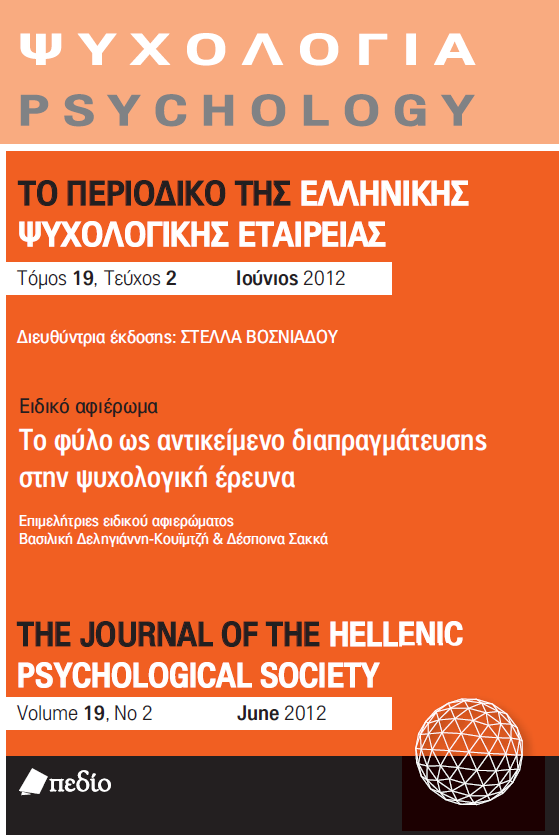«Αν ήμουν άνεργη και δεν ήμουν παντρεμένη, θα ήμουν ένα τίποτα…»: Έμφυλες διαπραγματεύσεις της ανεργίας

Περίληψη
Η παρούσα εργασία έχει ως στόχο να μελετήσει τους τρόπους με τους οποίους οι άνεργες έγγαμες γυναίκες μιλούν για, και δικαιολογούν την κατάσταση της ανεργίας τους σε σχέση με την κατασκευή των έμφυλων ταυτοτήτων. Ειδικότερα, εστιάζεται στην ανάλυση των διαθέσιμων γλωσσικών ρεπερτορίων, «ερμηνευτικών ρεπερτορίων», τα οποία οι γυναίκες χρησιμοποιούν, και στις συνέπειες των ρεπερτορίων αυτών στη διαπραγμάτευση της γυναικείας τους ταυτότητας μέσα στο συγκεκριμένο οικογενειακό και εργασιακό πλαίσιο και υπό την επίδραση της κυρίαρχης έμφυλης ιδεολογίας. Διεξήχθησαν ατομικές ημιδομημένες συνεντεύξεις με άνεργες έγγαμες γυναίκες. Η ανάλυση των συνεντεύξεων βασίστηκε στις αρχές της ανάλυσης λόγου, που τοποθετείται στο πλαίσιο των φεμινιστικών οπτικών. Διαπιστώνεται ότι οι συμμετέχουσες κατασκευάζουν και διευθετούν τις εργασιακές επιλογές και πρακτικές τους βάσει κυρίως παραδοσιακών αντιλήψεων και συνεπαγωγών για τη γυναικεία συμμετοχή στην αγορά εργασίας. Tο φύλο και η έγγαμη ιδιότητα παρουσιάζονται άμεσα συνδεδεμένα με τις αιτιακές αποδόσεις των γυναικών, καθώς η γυναικεία ανεργία επιχειρείται να δικαιολογηθεί ως μια «φυσική» κατάσταση των έγγαμων γυναικών δίχως οικογενειακούς υποστηρικτικούς μηχανισμούς και αναγνώριση της ανάγκης των γυναικών για αμειβόμενη εργασία. Οι έγγαμες γυ-
ναίκες φαίνεται να έρχονται αντιμέτωπες με προσωπικές συγκρούσεις και στερεότυπες κοινωνικοπολιτισμικές προσδοκίες και κατασκευές για τη γυναικεία ανεργία, και να αποδέχονται τελικά τους κυρίαρχους
λόγους που αναπαράγουν τον παραδοσιακό έμφυλο καταμερισμό εργασιακών και οικογενειακών ρόλων.
Λεπτομέρειες άρθρου
- Πώς να δημιουργήσετε Αναφορές
-
Τάζογλου Ε., & Δεληγιάννη - Κουϊμτζή Β. (2020). «Αν ήμουν άνεργη και δεν ήμουν παντρεμένη, θα ήμουν ένα τίποτα…»: Έμφυλες διαπραγματεύσεις της ανεργίας. Ψυχολογία: το περιοδικό της Ελληνικής Ψυχολογικής Εταιρείας, 19(2), 175–192. https://doi.org/10.12681/psy_hps.23615
- Τεύχος
- Τόμ. 19 Αρ. 2 (2012)
- Ενότητα
- ΕΙΔΙΚΟ ΑΦΙΕΡΩΜΑ

Αυτή η εργασία είναι αδειοδοτημένη υπό το Creative Commons Attribution-ShareAlike 4.0 International License.
Το περιοδικό ΨΥΧΟΛΟΓΙΑ έχει υιοθετήσει μία πολιτική Platinum open-access. Τα έξοδα υποβολής, επεξεργασίας ή δημοσίευσης των εργασιών καλύπτονται από την Ελληνική Ψυχολογική Εταιρεία. Τα πνευματικά δικαιώματα των δημοσιευμένων εργασιών προστατεύονται από την άδεια 'Creative Commons Attribution-ShareAlike 4.0 International'. Οι Συγγραφείς διατηρούν τα Πνευματικά Δικαιώματα και χορηγούν στο περιοδικό το δικαίωμα της πρώτης δημοσίευσης. Η άδεια αυτή επιτρέπει σε τρίτους, να χρησιμοποιούν την εργασία σε οποιαδήποτε μορφή, με την προϋπόθεση της διατήρησης των διατυπώσεων που προβλέπονται στην άδεια σχετικά με την αναφορά στον αρχικό δημιουργό και την αρχική δημοσίευση στο περιοδικό ΨΥΧΟΛΟΓΙΑ. Επιπλέον, κάθε διανομή της εργασίας οφείλει να γίνεται με τους ίδιους όρους διανομής, δηλαδή με την ίδια άδεια Creative Commons.


